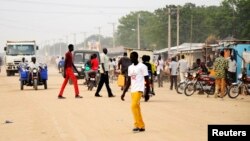South Sudan’s warring factions resumed talks on Thursday in another attempt to end the young nation's year-old conflict where intensive regional mediation efforts have yet to produce results.
The East African bloc IGAD is once again mediating peace talks between South Sudan’s government and the opposition. To ensure broad support for the outcomes of the peace talks, former political detainees, faith based groups and civil society organizations are once again part of the negotiations.
The immediate focus is a sustainable truce. At least four other cease-fire deals in the past year have been virtually ignored.
“The region and the entire world have been observing that the Cessation of Hostilities Agreements have never been implemented. And as a result, conflict still rages and a spectre of humanitarian catastrophe looms large due to the fact that the warring parties did not honor their commitment and recommitments to stop the violent conflict,” Ambassador Tewolde Gebremaskal is with the IGAD delegation.
This round of negotiations will also attempt to tackle the thorny political issue of the formation of a transitional government of national unity.
Inter-ethnic conflict
The crisis in South Sudan began a year ago, when a political dispute between President Salva Kiir and his then-deputy Riek Machar spiraled into an inter-ethnic conflict that has divided factions of the ruling party against eachother.
Machar supporters held a consultative meeting last week in Pagak, on the border of South Sudan and Ethiopia, to draft their position going into this new round of talks. General Taban Deng Gai, the lead negotiator for the opposition, outlined their vision for a transitional government.
“We must have an executive prime minister and executive president, counted as one. Number two, you have a structure of leadership of president, prime minister and council of ministers. You have a federation of 21 states. You have two armies and compensation and reparation,” said Deng Gai.
South Sudan now only has a president and the country is divided in 10 states.
The war has displaced more than two million people and killed possibly tens of thousands more. The United Nations says at least half the country is at risk of hunger and disease.
The United Nations Security Council has threatened several times to impose sanctions if no lasting agreement is reached. But, so far, no sanctions have been imposed.
South Sudan Factions to Discuss Peace Yet Again

ADDIS ABABA —



